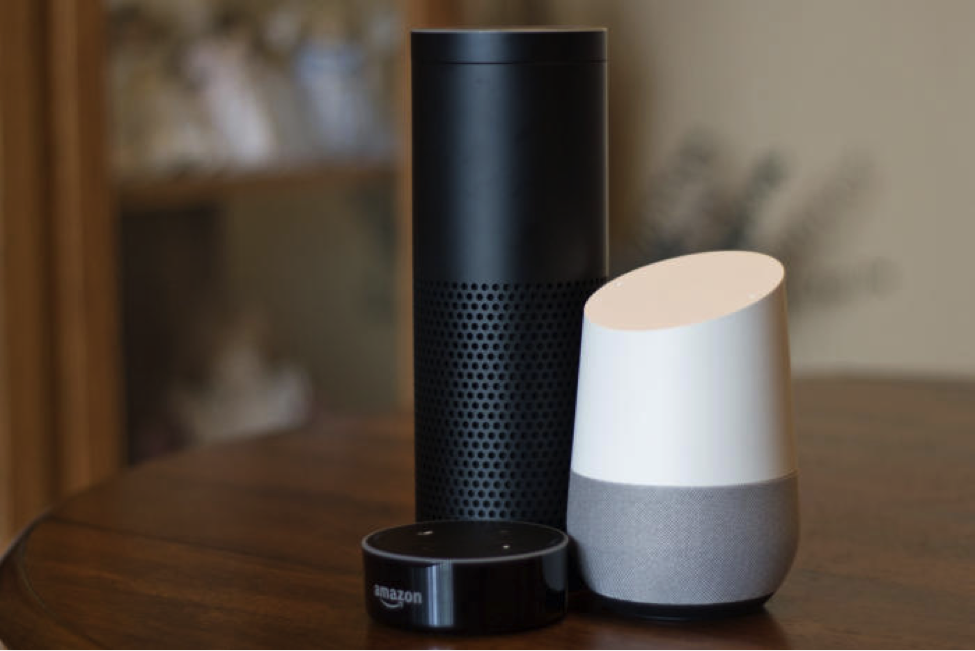Voice Assistants are Changing How Users with Disabilities Get Things Done
Voice Technology VOICE18 Voice Assistant 18-04-18 Jenny Medeiros 4 min read

Picture this: You roll out of bed in the morning, stumble over to the kitchen and call out, “Alexa, turn on the TV.” Good, background noise is on. Time to make some coffee.
You fumble around with your coffee maker and suddenly remember that you still don’t have a gift for your niece’s upcoming birthday. Oops.
“Alexa, order a chocolate gift box from Prime Now.” You listen to the product options, choose one, and confirm your order.
Done. That was a close one.
Technology sure is helpful. Now imagine this scene all over again, except this time you’re visually impaired.
For many able-bodied folk, virtual assistants are just another cool way for technology to make us feel like Tony Stark. But for many individuals with disabilities, it’s a complete game-changer.
From placing phone calls and texting their caretakers to unlocking front doors and ordering groceries; virtual assistants are making important steps towards accessible UIs for the masses.
But that’s quite enough from someone who has never even used crutches before. Let’s hear how voice assistants are changing the lives of the disabled from the actual people who use them.
“It saves valuable time”
Robin Christopherson, head of digital inclusion at AbilityNet, makes a great case for AI for accessibility by explaining how the disabled community is benefiting the most from the escalating efforts of tech giants.
Being visually impaired himself, he found that virtual assistants such as Siri, Cortana, and Google Now already save him and other people with disabilities valuable time when getting things done.
No more battling with screen readers and “accessible websites” for Christopherson. He adds, “What Siri can do in five seconds might take me five minutes, or sometimes ten!”
“Google Assistant opens many new avenues”
In 2015, Jamison Hill lost the ability to speak and could no longer use his beloved Siri for essential, everyday tasks. He could still use Siri’s “Speak selection” tool to read emails or articles, but he couldn’t say, “Hey, Siri” to do what everyone else does on a whim.
Then came along Google Assistant with its uncreative name and a whole new option to use either voice or text commands. It immediately made Jamison’s life easier. He could now type in medication reminders, look up his doctor, and even order medical supplies online. Sure, he can also do these tasks manually, but virtual assistants just make it so much easier.
While Jamison maintains that the perfect assistant doesn’t exist, they have certainly improved his life. Although his particular case is a stark reminder to the designers and developers of virtual assistants that there are many other disabilities to consider.
“I use Amazon Echo to control music, TV, and do math”
Annie Segarra, a Youtuber and activist for an accessible future, explained in an ad-hoc Twitterview how she mostly uses Alexa for entertainment and mental health purposes. From playing music and controlling the TV to solving math questions.
Alexa has been quite the asset for her daily tasks and Segarra is already planning on purchasing all the extra knick-knacks to give Alexa even more control. Although she does point out that sometimes voice commands are difficult to give during flare ups where even talking is a “mountain-like task”.
“Alexa has become an invaluable part of my ecosystem”
Sam Berman, an Accessibility Consultant, described in a LinkedIn post all the ways he has found virtual assistants to be beneficial for the disabled. As someone who can type with only one hand, the rise of VUIs was a welcome addition to his lifestyle.
He notes how he loves Google Home’s “proactive notifications”, which he considers a goldmine for those with memory loss. This feature allows Google Home to wake itself up and provide reminders about medication intake and scheduled activities.
He also points out how Amazon’s Alexa allows short voice commands like “Timer, 15 minutes” instead of “Hey Google, set a timer for 15 minutes.” A resounding benefit for those with cognitive disabilities.
At this point, it’s safe to say that virtual assistants are far from being the perfect solution for every person with disabilities, particularly for those with speech impediments.
They do, however, present a unique opportunity that can be leveraged by many disabled users to help them accomplish daily goals and overcome everyday challenges. But are AI devs actively considering disabilities during their process? Or is it more of an afterthought?
Fortunately, people like David Isbitski, Ahmed Bouzid, Robert McCauley, and Lauren Golembiewski are dedicated to bridging the gap between users and VUIs. You can pick their brains on the future of voice assistants for the disabled at VOICE, July 24-26 in Newark, NJ. (See you there?)

Jenny Medeiros
Jenny is an engineer turned tech writer with hands-on experience in VR, AR, video game development, and UX-focused web design. Nowadays, she partners with tech companies to help explain emerging technologies simply. When she's not writing, she's likely daydreaming and forgetting her tea.